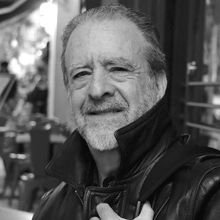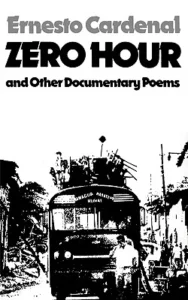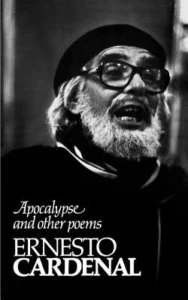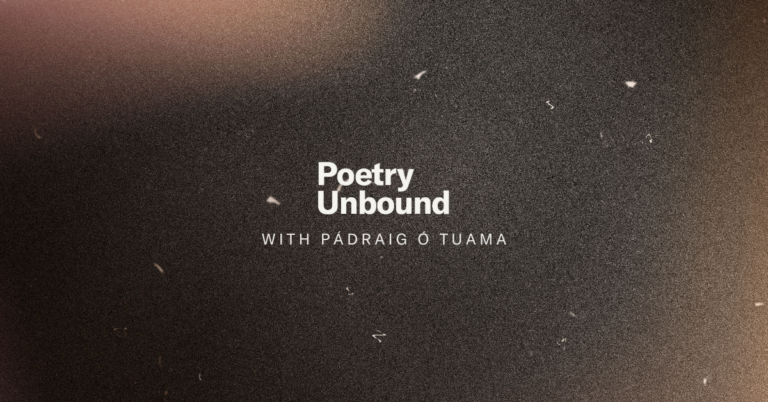Ernesto Cardenal
Give Ear to My Words (Psalm 5)
When dictatorial leaders use talk of peace as a smokescreen to conceal their plans for war and destruction, what are the people to do? Believe in a vision of peace and freedom that is muscular, sturdy, and protective — and pray that it holds, as Ernesto Cardenal does in his poem “Give Ear to My Words (Psalm 5),” translated by Jonathan Cohen.
We’re pleased to offer Jonathan Cohen’s translation of Ernesto Cardenal’s poem and invite you to subscribe to Pádraig’s weekly Poetry Unbound Substack newsletter, read the Poetry Unbound book, or listen to past episodes of the podcast. We also have two books coming out in early 2025 — Kitchen Hymns (new poems from Pádraig) and 44 Poems on Being with Each Other (new essays by Pádraig). You can pre-order them wherever you buy books.
Guests

Ernesto Cardenal (1925–2020) was a Catholic priest and poet who was born in Nicaragua. From 1979 to 1988, he served as the Minister of Culture there. Cardenal was the author of several volumes of poetry, including Pluriverse, Zero Hour, Apocalypse, and In Cuba.

Jonathan Cohen is an award-winning translator of Latin American poetry and a scholar of inter-American literature. He has translated Ernesto Cardenal, Enrique Lihn, Pedro Mir, and Roque Dalton, among others, and his own poems and essays have been widely published. He is the author of pioneering critical works on Pablo Neruda and Muna Lee.
Transcript
Transcription by Alletta Cooper
Pádraig Ó Tuama: My name is Pádraig Ó Tuama, and a number of years ago I was at a poetry reading in England and the British poet laureate at the time, Carol Ann Duffy, was reading some of her poems. And she said in the middle of her reading, “I don’t believe in God, but one of the things that I think I’d love if I did believe in God was the sense that I was being listened to.” And then she looked around and she said, “That’s why I like poetry.” And I loved what she said. I thought it was such an elevation of what it is we’re hoping that can happen when we turn to a poem or write a poem, that somehow we’re hoping that the page will listen even if nobody else hears or sees or reads this poem, that somehow there can be a listening back and forth between the person writing and themself as they’re in conversation with the words as they emerge on the page.
[music: “Praise the Rain” by Gautam Srikishan]
“Give Ear to My Words (Psalm 5)” by Ernesto Cardenal, translated by Jonathan Cohen
“Give ear to my words O Lord
Hear my groans
Listen to my protest
For you are not a God who is a friend of dictators
nor a supporter of their politics
nor are you influenced by their propaganda
nor do you associate with any gangster
“There’s no honesty in their speeches
nor in their press releases
“They talk of peace in their speeches
while they increase their war production
“They talk of peace at Peace Conferences
and secretly prepare for war
“Their lying radios blare all night long
“Their desks are piled with criminal plans
and sinister documents
“But you will protect me from their plans
“They speak through the mouth of machine guns
Their flashing tongues
are bayonets…
“Punish them O God
foil their politics
mix up their memos
block their programs
“At the hour of the Alarm Siren
you will be with me
you will be my refuge on the day of the Bomb
“You bless the righteous
who don’t believe in the lies of their ads
nor in their publicity and political campaigns
“Your love surrounds them
like armored tanks”
[music: “Kindling” by Gautam Srikishan]
This poem is modeled after a psalm from the Hebrew Bible, Psalm 5. I love the Psalms. They are so strange and emotional and immediate. It’s absolutely clear when you read a psalm who it is they think their enemies are, and what it is they hope for, and how they feel. And they’re crying here and shouting there, and looking for punishment here. You see the same kind of energy and impulse in this poem of Ernesto Cardenal’s. He’s absolutely straightforward about what he sees as justice and who it is that he sees as being against justice.
His words are clear, but actually, this isn’t only a poem with clear words, it’s also a poem about words. The title itself, “Give Ear to My Words” — and that’s the first line as well — “give ear to my words O Lord,” and then “hear my groans.” We’re engaging in a poem here that’s talking about what it means to hear. And then, for almost the rest of the poem, there’s all of these ways within which violence and evil manifest itself through language: propaganda, speeches, press releases, “Lying radios,” “sinister documents,” “speak through the mouth of machine guns / Their flashing tongues / are bayonets.” It’s a long litany of highlighting the ways within which lying language can be made manifest in all kinds of ways. And one of the things that this poem of Ernesto Cardenal’s is intelligent about is what does it mean to have a campaign of lies? And what does it mean to try to call that out?
[music: “Levander Crest” by Blue Dot Sessions]
This poem follows the direction of a lot of psalms. It starts off with an appeal to be heard, and then there’s a condemnation about what’s going wrong that takes up most of the poem, really, “Listen to my protest.” And then he reminds himself and he reminds God, I suppose, in the context of the one that he’s addressing: “You will protect me from their plans.” And then he goes back to protest. And then there’s a clear request: “Punish them O God / foil their politics.” And then he doesn’t ask for his enemies to be exterminated. And certainly, that’s a distinction from some of the biblical psalms. Sometimes the biblical psalms do ask for the end of the enemies. I think it seems that he’s asking for punishment and stopping of the enemy.
He reminds himself of accompaniment. It’s like he’s trying to encourage himself, “You will be with me.” And he reminds himself of promises that he believes, “You bless the righteous.” And it finishes at the end in such an unusual stanza. And he’s been speaking about the righteous, and then he speaks about who the righteous are, the people “who don’t believe in the lies of their ads / nor in their publicity and political campaigns.” And then there’s a separate stanza right at the end, very short, “your love surrounds them / like armored tanks.” Who is “them” there? I wonder, is this saying that the righteous are surrounded by armored tanks that are protecting them, or that the enemies are surrounded by armored tanks? And that’s the love of God, as he’s putting it, and saying that the armored tanks are circling around people who are lying.
I love the ambivalence of the translation by Jonathan Cohen of the Ernesto Cardenal poem into English. I love the absolute un-clarity as to who is it that’s being surrounded and what direction are the tanks facing? And also the fact that he links tanks with love, “your love surrounds them / like armored tanks.” This isn’t a kind of a weak-willed imagination about what peace looks like. This is muscular. This is saying, evil plans need to be foiled, need to be stopped. And I think this is so powerful in its language. What you see here is somebody who’s steeped in that old history, who’s translating that old form into very contemporary language and is trying to use it to address the deathly circumstances that were being faced under a dictatorship.
[music: “Every Place We’ve Been” by Gautam Srikishan]
Ernesto Cardenal was born in 1925, and he died 95 years later, in 2020. Born in Nicaragua, he studied architecture initially, then he moved to study literature and poetry, and then he became a Catholic priest. But he’d always been interested in the ways within which faith and politics, and obviously then the pursuit of his studies as well, art, he’d always been interested in the overlap of all of those things. In the ‘60s, he worked in the Solentiname Islands. There was people there who were seeking refuge from a dictatorship, and he wrote the most extraordinary book there called The Gospel [in] Solentiname. He’d read the Sunday Gospel, they’d have outdoor masses, and instead of giving a homily, he’d say to people, What do you think? And after he was finished mass, he’d go home and try, as far as it was possible, to write down what people had said. And he also recorded their names. I’ve got a copy of The Gospel [in] Solentiname at home. And when you read through it, you read people in the ‘60s who were facing horrific oppression, who were bringing their oppression and their resistance and their faith and their doubt into conversation with ancient text. It’s a beautiful record, and in many ways, I think of it as a primary liberation theology text.
In the ‘70s, Ernesto Cardenal became actively engaged in the revolution against the Somoza dictatorship in Nicaragua. And then in 1979, with the New Sandinista government, he was appointed minister of culture and he was critiqued over the ‘80s by the U.S. government and the Vatican for his political involvement. In 2019, Pope Francis did issue a certain kind of apology to him, recognizing the pain and suffering that Ernesto Cardenal must have experienced by being critiqued for doing the very thing that the very texts that the church would often recite during mass. So there was an apology of a form offered to him, and he died a year later.
The Sandinista government had been critiqued by the U.S. and other places, too. The government itself would say that it was characterized by its commitment to social justice and revolutionary ideas and reforming society on behalf of the poorest of society. But there was a lot of opposition and criticism regarding human rights and authoritarian processes during the time, too. So Ernesto Cardenal, in a way, his public life as a politician went in the way that in a certain way you’d hope for, that somebody goes in with motivations for improvement, and he and his colleagues and government were being held to account as well. But, even if this poem does cry out for a miracle, certainly the witness of his life is a demonstration of the slow, step-by-step complicated model of improvement of political and social structures.
[music: “Catching Water” by Gautam Srikishan]
On a formal level, of course, this as a psalm, is a poem — all the Psalms are poems, some of them are set to music — but of course, it’s a prayer as well. It’s directed to a “you.” I’ve spent a lot of time, probably too much time in my life, really, thinking about prayer and worrying about prayer. The word in English, “prayer,” comes from the French “prier” to ask. And so, to pray is to ask, which means then that to pray is to need something or want something. And want can mean a lack or a desire.
I am not convinced that everybody who prays necessarily has a clear understanding of the direction that their prayer goes to. Perhaps all they know is the place that their prayer is coming from, their deepest yearnings of their own self. The deepest yearnings of their heart. And, I think that’s enough. If it’s not, I’m screwed because certainly, I’ve moved further and further away from the idea that I can say anything about the direction of our prayer. All we can hint at really, and, and wonder at, and marvel at is the fact that in every culture we’ve had something like prayer emerge, some way within which language and art and public ritual gather around the desire of people for increased safety, for increased community, for increased public flourishing.
I wonder if prayer works, and in some ways, that’s a question for people who are proposing a certain form of belief. But in the context of this poem by Ernesto Cardenal, in a way, it might be its own answer. Because even if he wasn’t being heard by anything outside of him, he was being heard from the page, and the page was giving him his own courage back. The page was letting him know, you are in communion with people across millennia who have used form like this, who’ve reused and reinvented and broken and remade language to suit the dire circumstances that they’re facing. And so the poem itself, the prayer, the plea, the desire is a demonstration of the ways within which that limited, sometimes pained communion of conversation and hope for justice can link us up with other people who have similar hopes. Whether I do or don’t believe, what I certainly do is I want.
[music: “The Edge of All There Is” by Gautam Srikishan]
“Give Ear to My Words (Psalm 5)” by Ernesto Cardenal, translated by Jonathan Cohen
“Give ear to my words O Lord
Hear my groans
Listen to my protest
For you are not a God who is a friend of dictators
nor a supporter of their politics
nor are you influenced by their propaganda
nor do you associate with any gangster
“There’s no honesty in their speeches
nor in their press releases
“They talk of peace in their speeches
while they increase their war production
“They talk of peace at Peace Conferences
and secretly prepare for war
“Their lying radios blare all night long
“Their desks are piled with criminal plans
and sinister documents
“But you will protect me from their plans
“They speak through the mouth of machine guns
Their flashing tongues
are bayonets…
“Punish them O God
foil their politics
mix up their memos
block their programs
“At the hour of the Alarm Siren
you will be with me
you will be my refuge on the day of the Bomb
“You bless the righteous
who don’t believe in the lies of their ads
nor in their publicity and political campaigns
“Your love surrounds them
like armored tanks”
[music: “Praise the Rain” by Gautam Srikishan]
Chris Heagle: “Give Ear to My Words (Psalm 5)” translated by Jonathan Cohen comes from by Ernesto Cardenal’s book Pluriverse. Thank you to New Directions Publishing who gave us permission to use Ernesto’s poem. Read it on our website at onbeing.org.
[music: “Praise the Rain” by Gautam Srikishan]
Poetry Unbound is: Gautam Srikishan, Eddie Gonzalez, Lucas Johnson, Kayla Edwards, Tiffany Champion, Cameron Musar, and me, Chris Heagle.
Our music is composed and provided by Gautam Srikishan and Blue Dot Sessions.
This podcast is produced by On Being Studios, which is located on Dakota land. Open your world to poetry with us by subscribing to our Substack newsletter. For links and to find out more visit poetryunbound.org.
Books & Music
Recommended Reading
The On Being Project is an affiliate partner of Bookshop.org and Amazon.com. Any earnings we receive through these affiliate partnerships go into directly supporting The On Being Project.











